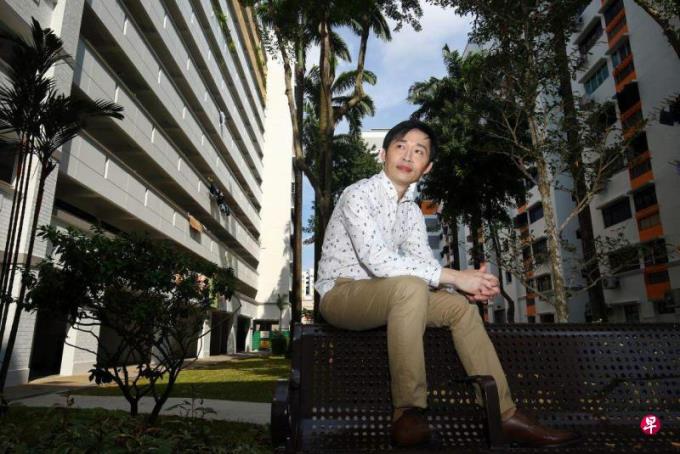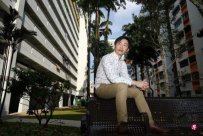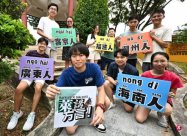
The fourth -generation Singaporean Chinese, except for the circle of friends such as Xiaohongshu, B, Douyin, and WeChat, do you need more friends?Will they be in Singapore, but live in the virtual "Internet China"?Each generation of Singapore Chinese people must have their own style and connotation.In the future, Chinese people in Singapore are likely to be increasingly not understanding Nanyang University, no resonance with new rumors, and the main outlook dialects are no longer the five major. While consolidating and strengthening the advantages of multiple races, they should continue to allow Singapore's multiculturalism.Keep hundreds of flowers.
Last week attended the encounter presented by the Singapore Chinese Orchestra in the Concert Hall of the Binhai Art Center.
Singaporeans born before and after the founding of our generation and are born in Chinese as the main language to Liang Wenfu lyrics are familiar, including feelings and memories inside.For example, the opening song is written to you. Even if the pure music performance does not sing, we can sing 120 -character lyrics composed of row sentences with the notes, which is the teenager feelings engraved in the bottom of the heart.
In the second half, music and lyrics sealed another kind of memory that transcended personal society and times, our country and cultural identity.The most amazing thing is the Singapore style in the music adapted by the composer Wang Chenwei.In particular, Liang Wenfu's creative bamboo branch created in 1990. This song has a few words of Cantonese and Fujian dialect because of the lyrics.Fortunately, it was lifted in 2013.
Wang Chenwei added six style instruments of the five Chinese nationality in Singapore in the adaptation work, including Tigo, Coconut Hu Hu, Hainan Tunxian, Hakka head strings, and Fujian in Chaozhou and Hakka music.Nanyin Pipa.When each style musical instrument is played, you can hear the charm of these dialects.
What is even more rare is that no matter Wang Chenwei or the players who play these style instruments, neither these musical instruments belong to.Music is the art of cross -language. Mastering the style of different music is the essential ability of the performers. The performers from the four seas of the world, through Wang Chenwei's arrangement, under the command of Guo Yongde, the first native commander of the Singapore Chinese Orchestra, the water and milk are blended together.Thanks to the nourishment of the Chinese culture we have suffered, and the baked "Singapore School" is even more delicious.
3,000 audiences attending the concert left the Binhai Art Center Concert Hall with a moving and satisfying mood, including State Li Xianlong and his wife He Jing.25 new rumors, beautiful notes and poetic characters, resonate with the values engraved in our brains and the cultural identity in our hearts.
On the way out of the concert hall to the parking lot, I think of the same place a week ago, I just walked out of the "Urban Reading Festival" finale-writer Xu Zhiyuan's "An Unexpected Traveler" conversation , two activities are put together to stimulate me to think about the meaning of Singapore Chinese and "Chinese".
"Chinese people" may not be the best description, but I don't want to use "Chinese school students", a term with specific historical significance, once used to describe the "essence" or "Chinese intellectual" of Chinese elite, whichIt is impossible to summarize all Singaporeans who are accustomed to thinking, reading and living in Chinese and Chinese, but at the same time in English and English in the work and living environment.
I divide Singapore Chinese people into four generations.This is not an academic division, but after contacting the Singaporeans of different backgrounds, as well as as a Chinese media worker, the distinction of this industry under the prospects of Singapore.
The first generation of Chinese people, a large part of the graduates of Nanyang University, have always been discussing in various aspects.Last month, my former boss Lin Renjun's column article was unbelievable, which caused some sounds.I don't discuss that historical issue.
I am more familiar with the second and third -generation Chinese people. These are classmates, colleagues and friends who have a common emotional memory with me.Those who are a little older than me, under the change of education, English suddenly changed from the second language to the first language. Mathematics, science, and geographical textbooks all changed to English., Pulling up and followed.I ca n’t go to college, but those who have completed basic education, some skills can stand in society.
Friends who write new rumors and sing new rumors, including Liang Wenfu, are the representatives of the second generation of Chinese people.
The third -generation Chinese is a bilingual Singaporean.Chinese is not a burden on them, but an advantage.It may not be a working language, it is a language communication language that can reach the heart.Even if you don't read Chinese very much, the beauty of Chinese and various culture can still attract them.
Wang Chenwei, who re -arranged for Liang Wenfu's works, is the third generation of Singapore Chinese in my heart.He was born in Beijing in 1988 and immigrated to Singapore with his parents at the age of four.He can speak and write in Chinese and English at ease, and in addition to writing at least 10 types of text including Tamilwin, Arabic, and Sanskrit.He seriously studied all kinds of music in Singapore, gained nourishment from it, enriched his artistic creation, and made him a real Singapore composer.
I am most interested in the fourth -generation Chinese.According to previous reports, from 1999 to 2019, the proportion of Chinese freshmen at home has increased from 42%to 71%. Now we see that in your 20s, if you still use Chinese as the main term, thenThey do not grew up in Singapore, but new immigrants or quasi -immigrants who have come to school or work in Singapore in the past ten years.
Young people who can read Chinese in Chinese, the Chinese writer Xu Zhiyuan and Taiwanese writer Peter Su (Su Shihao) are empty.At the conversation between Xu Zhiyuan, except for a middle -aged Singaporean reader, I was impressed by the young people from the Chinese background.This makes me feel excited on the one hand, and on the other hand, I feel uncertain.
Excitement is that there is a market that still has new blood in Singapore, and these young people can easily discuss profound and abstract cultural issues in Chinese.
It is uncertain that today, in the end of the Internet, the fourth -generation Singaporean Chinese people, except for the circle of friends such as Xiaohongshu, B, Douyin, and WeChat.How many friends?Will they be in Singapore, but live in the virtual "Internet China"?
If they have chosen to live in Singapore, the Chinese cultural circle in Singapore will inevitably surpass the existing method of "retaining tradition" and create the content and activities that can keep up with the times.Establish them and must belong to Singapore's cultural language.
This job is not easy. Those who are engaged in media and information dissemination must do, and educators must also work on the upstream.The government can't think that as long as you provide good jobs and investment opportunities to attract high -quality new immigrants to settle here, they will naturally become Singaporeans.
Every generation of Singapore Chinese people must have their own style and connotation.In the future, Singapore Chinese people are very acceptableThe dialects that can not understand Nanyang University, cannot resonate with new ballads, and the main native origin are no longer the five major. While consolidating and strengthening Singapore's advantages of diverse races, they should continue to keep Singapore's multiculturalism.Let Singapore not only an economic homeland, but also a spiritual home.




